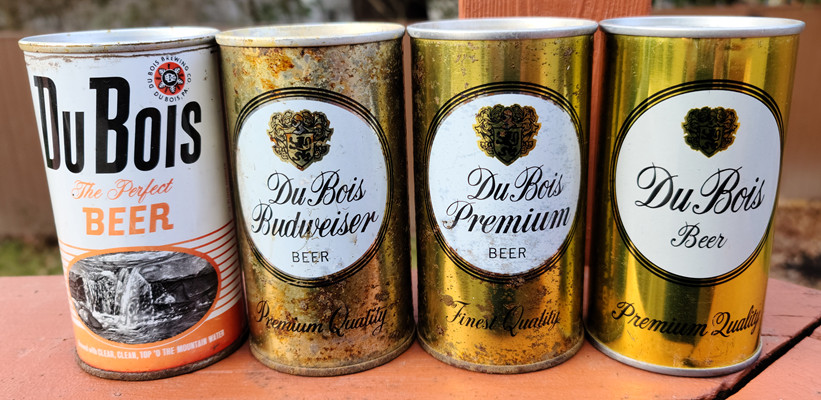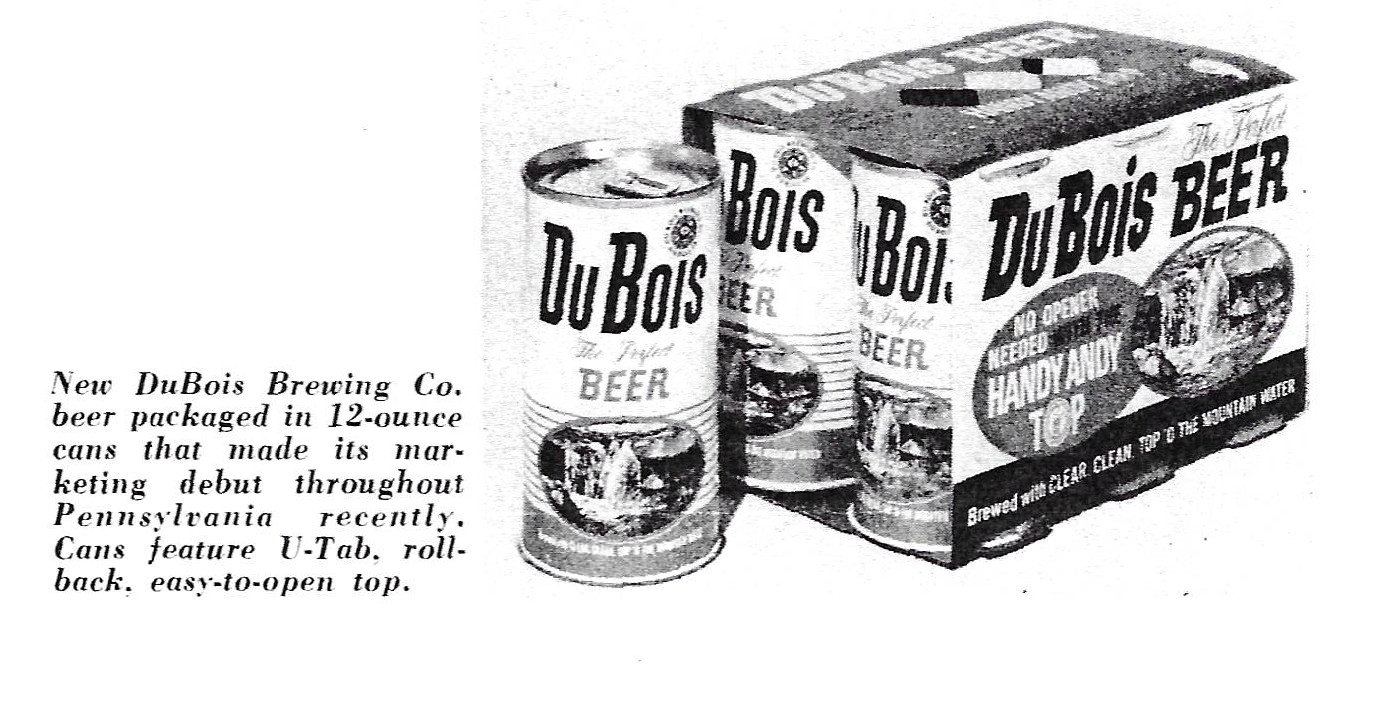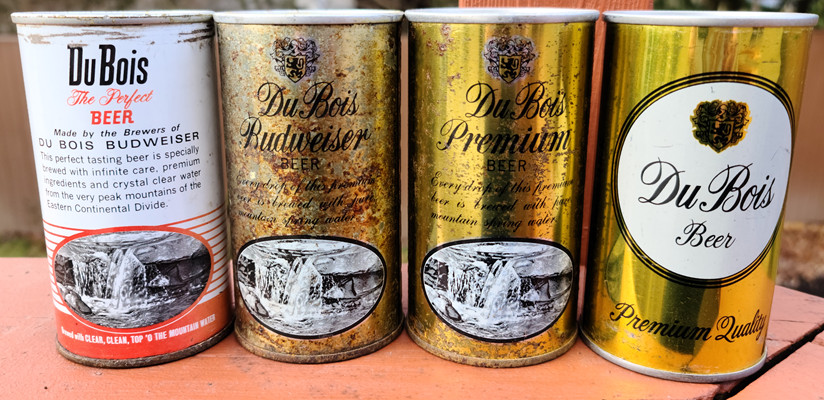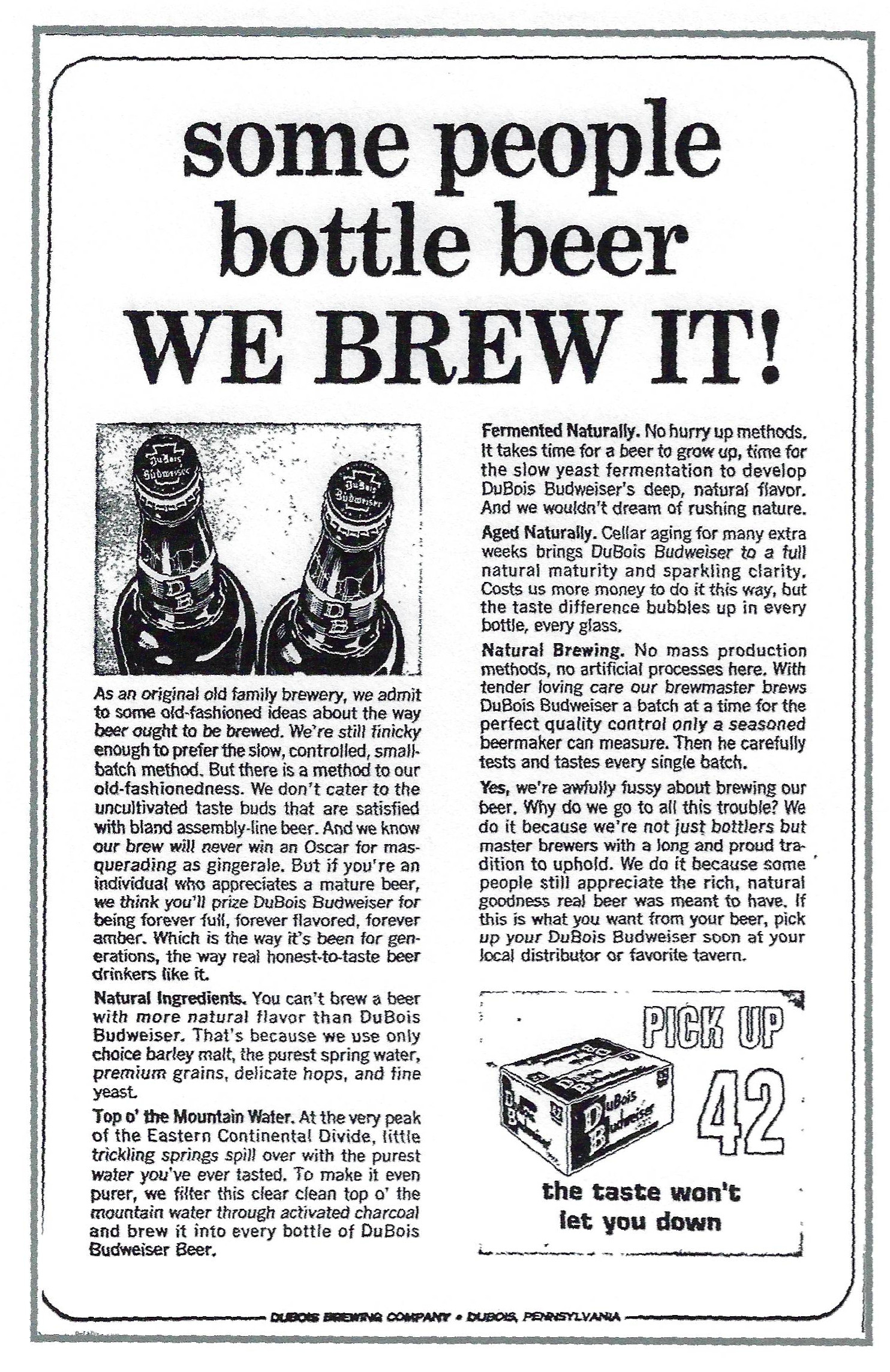DuBois "Budweiser"
 |
This month let’s look at one of the most famous examples of a label change forced by legal action, DuBois Budweiser from Dubois Brewing in DuBois, Pennsylvania. Budweiser is of course, the famous brand made by Anheuser-Busch. “Budweis” was originally a style of beer made in Bohemia, specifically in Budweis (now České Budějovice, Czech Republic). In 1876, German-born Adolphus Busch and his friend Carl Conrad developed a "Bohemian-style" lager in the United States, inspired after a trip to Bohemia and produced it in a brewery in St. Louis, Missouri. This became the “Bud” that currently makes up about ½ of all beer sales in the US in its various guises.
In the late 19th century, there were multiple breweries around the US that made a “Budweiser” beer but as Anheuser-Busch (AB) grew into one of the nation’s big “shipping breweries” (i.e. a brewery that shipped its beer over much of the US) the name increasingly became Anheuser Busch’s sole property. Multiple breweries used the name Budweiser before Prohibition (1920-1933); over two dozen. But it became increasingly known as AB’s brand and the St. Louis brewery launched a series of legal actions to force its competitors to stop using the name.
In 1905 little DuBois Brewing in western Pennsylvania began making their own Budweiser to sell in a limited area. AB took them to court in 1908 but withdrew their suit in 1909 citing the ill health of Adolphus Busch as a reason. They left the matter until 1940, probably because the tiny brewery was not worth much effort. But by waiting so long they game DuBois legal ammunition. In 1940 when AB again tried to stop DuBois from using the name, the court noted that the small brewery had been using the name for years without apparent injury to the St. Louis brewery, by then one of the three largest in the US. The courts ruled again in the late 1940s, upholding DuBois right to use the name, but in its own limited geographic home area.
The legal contest reached a peak in the 1960s. The DuBois Brewery was sold to Pittsburgh Brewing, which had more brewing capacity and a larger sales area reaching areas outside DuBois’ marketing area. When AB took them to court, Pittsburgh brewing won, but by agreeing to limit the geographic range of the sales of the smaller “Budweiser.” In 1970, however, AB finally won, over ninety years after first filing suit. Pittsburgh had to destroy all of its DuBois Budweiser marketing material. The name “Budweiser” in the US was now AB’s alone.
The Cans
Here are four DuBois cans, the first two with the Budweiser name, and the last two without. There may be other variations of which I am unaware.
 |
1: The first can, circa 1963, has the name in all caps on the back and emphasizes it was made with “mountain water.”
 |
2: The second has Budweiser on BOTH the front and back (take that AB!) I think this can dates to 1967.
3. They drop the Budweiser, so this can probably dates to late 1970.
4. The back of the can drops the information about mountain water, so I think this can dates to 1972 when the DuBois brewery closed and the beer would have been made in Pittsburgh instead of DuBois.
 |
The Timeline
I’ve broke down the various lawsuits and legal actions into this timeline. It is not complete for every legal action, but does contain all the ones I could find information about.
1876: AB starts selling Budweiser nationally in bottles. The rights are owned by Carl Conrad.
1882: Conrad goes bankrupt and sells his firm, including the rights to “Budweiser” to AB.
1890s: other US Budweisers are brewed by breweries including Leisy’s (Cleveland), Schlitz and Miller (both in Milwaukee) and the Budweiser Brewery in Brooklyn. Prospect Brewery in Philadelphia made a “Budweis” and Franklin & Hayes Brewing in Idaho made a beer named “Bud.” Before Prohibition (1920) at least two dozen breweries used the name “Budweiser” for at least one of their beers.
1898: Brooklyn’s Budweiser Brewery forced to change their name (to Nassau Brewing) and to rename their beer from “Budweiser.” That same year AB sued Miller for their use of the name. In the case vs Miller, AB referred to “Budweiser” as a descriptive term, which DuBois would repeatedly use as a defense.
1905: DuBois brewing starts selling their own “Budweiser.”
1907: AB registers “Budweiser” as trademark. A German brewery registers a complaint as they were using the name in the US already.
1908: AB files suit against DuBois.
1909: AB withdraws its suit against DuBois citing their president’s (Adolphus Busch) poor health.
1911: AB settles suit with German brewery for 82,500 Kroner over using the trademark “Budweiser.” They also settle with a brewery in Budweis for another large sum of money. AB can use the name “Budweiser” in the US but can not sell it under that name in Europe. The European breweries can use the name in Europe but must use the name “Imported Budweiser” in the US.
1937: A Czech brewery starts to sell “Budweiser’ in the US. AB considers a lawsuit but decides the bad publicity was not worth the trouble.
1939: AB gains the exclusive right to “Budweiser” from the Czech brewery for the US. The Czech brewery was probably a bit preoccupied at the time as Germany was in the process of dismembering Czechoslovakia.
1940: DuBois Brewing allowed to sell “Dubois Budweiser” in a limited area centered on their home in western Pennsylvania. The Court noted that AB had withdrawn their suit in 1909 and had never refiled their intention to continue legal action vs DuBois.
1947: DuBois claims that “Budweiser” is a geographic and descriptive name and cannot be considered exclusive to AB. The courts disagree, but DuBois still allowed to sell their own Budweiser in their home region.
July 1963: In an agreement with AB, DuBois can continue selling “Budweiser” in a limited area.
Spring 1964: DuBois introduces a new “Budweiser” can. The front says “Dubois: The Perfect Beer” but the back includes the name “DUBOIS BUDWEISER” in all caps. The label also brags that it is “Brewed with Clear, Clean Top ‘O the Mountain Water.” (Can #1 in the lineup)
1967: DuBois purchased by Pittsburgh Brewing company with the condition to keep the DuBois brewery open for at least five more years. This may be when they switched to the gold DuBois Budweiser can. (Can 2 in the lineup)
1968: AB contends that Pittsburgh Brewing is selling DuBois Budweiser in six eastern states, contrary to the agreements of 1905 and 1940 limiting its sale to western Pennsylvania. The parties agree in court that Pittsburgh can sell the beer in western Pennsylvania, five upstate counties in New York, and four counties in Ohio. This left out the right to continue selling the beer in West Virginia.
September 1970: The courts rule that DuBois must give up using the Budweiser name and must destroy all their “Budweiser” packaging by October 31. This is probably when the gold can switched from “Budweiser” to “DuBois Premium.” (Can #3). AB receives no damages but has exclusive use for the name in the US now.
1972: Pittsburgh Brewing closes the DuBois brewery. This may be when they switch can designs, abandoning the “Mountain Water” claims on the can back. (Can #4)
===========================================================
A 1966 Ad. Note how they tweek "mss production" breweries (like Anheuser-Busch perhaps!)
 |
Sources
"Reminiscing" Metropolitan News-Enterprise, (August 4, 2005) Accessed January 28, 2021.
"DuBois Brewing Company" DuBois Area Historical Society Accessed January 28, 2021
"This Bud's NOT For You" Pieces of History, National Archives Accessed January 28, 2021
Hernon, Peter and Terry Ganey. Under the Influence: The Unauthorized Story of the Anheuser-Busch Dynasty (New York: Avon Books, 1991).
